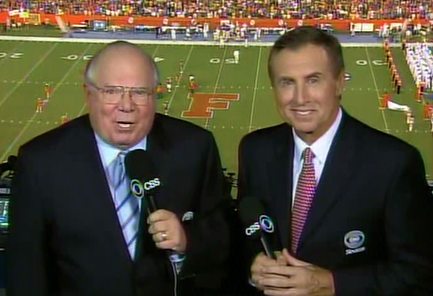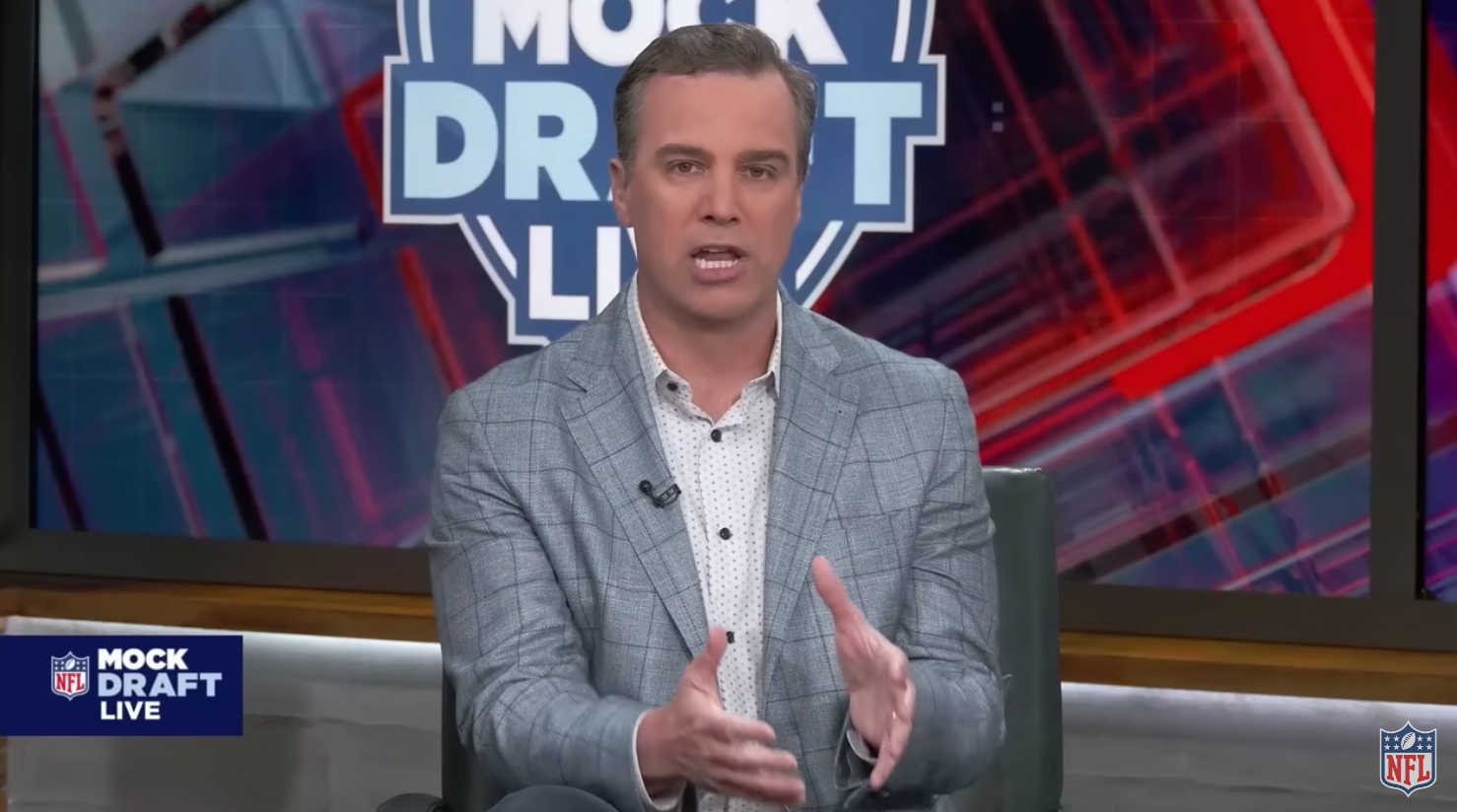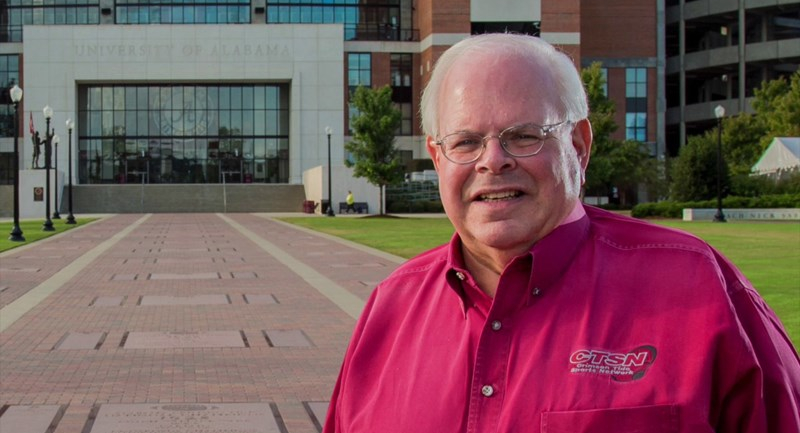Gary Danielson will join Verne Lundquist for the call of this Saturday’s SEC on CBS game between the Alabama Crimson Tide and the Texas A&M Aggies, at 3:30 p.m. Eastern time.
*
Before Gary Danielson joined the SEC on CBS (and Uncle Verne), he enjoyed a lengthy run at ESPN and ABC, calling games with (among others) Brent Musburger and Brad Nessler. He is a fixture in the college football broadcasting business, and that can mean one or both of the following:
1) You become comfortable in your work, such that you relish the challenges of the business at every turn.
2) A lot of people think you hate their team on Saturdays.
Inevitably, football and broadcasting overlap for Danielson and all his fellow travelers in the business, colleagues and competitors alike. What follows will possess some football content, but is primarily a look inside the world of Gary Danielson the broadcaster, not the football man.
*
It’s easy, in this social media age, to think that Twitter’s view of a visible person (such as a network broadcaster) is the way most of the nation views that same figure. In some cases, that inclination turns out to be correct, in other cases not as much.
Twitter was founded in 2006, but Awful Announcing didn’t join Twitter until August of 2010. I didn’t join until the spring of 2009. For many of us, “social media” didn’t become a prevalent part of life and work until the very end of the “aughts” and the beginning of the “teens” in this century. It’s therefore hard to opine that Twitter is what changed national views of Gary Danielson.
Twitter was not a daily part of our (social) media diet in December of 2006, when views of Danielson began to change (and, instructively, to intensify as well) for one specific and memorable reason:
Danielson — during the latter stages of the 2006 SEC Championship Game between Florida and Arkansas — argued why the Gators, not Michigan, should play Ohio State in the 2007 BCS National Championship Game.
For many, the setup seemed all too obvious: “Network broadcasting the SEC touts SEC team, serving as house organ. Announcers are in-the-tank homers for the SEC team in the championship chase. What a joke.”
Given everything we’ve seen in the nearly nine years since Danielson made the case for Florida over Michigan — despite the fact that he played in the Big Ten (Purdue), was born in Detroit, and spent the entirety of a long NFL playing career in the Midwest (nine years with the Lions as well as three others with the Cleveland Browns) — it’s very hard for the casual fan to believe that Danielson came by his views honestly on that night in Atlanta’s Georgia Dome.
Yet, if you talk to Danielson, that’s exactly what he’ll tell you.
Convinced? You might have made up your mind long ago, but if you’re willing to hear him out, Gary Danielson might give you reason to think that he’s not engaging in political spin.
*
There’s a counterintuitive aspect to the topic of Danielson’s intellectual independence on the SEC. The strongest case Danielson makes is one which pre-dates his 2006 SEC Championship Game broadcast; the arrival of Twitter; and the CBS portion of his luminous broadcasting career. What Danielson said and did BEFORE social media, before becoming the analytic voice of the SEC on network television, shows that he certainly has a track record of callin’ it as he sees it.
“It’s impossible to say that the surrounding environment (in the SEC) hasn’t shaped my responses and words on the air,” Danielson said, “but when Oklahoma lost the Big 12 title game (to Kansas State in 2003), I said the Sooners did not belong in the national championship game, which I did that season.”
Danielson is referring to the 2004 Sugar Bowl between Oklahoma and LSU. Danielson joined Brent Musburger for that broadcast on ABC. Danielson wasn’t the national title game broadcaster every year the way Kirk Herbstreit is today; ABC rotated announce teams based on the bowl game which had the title game. This was before the Bowl Championship Series, in the 2006 season, created the stand-alone BCS National Championship Game as a fifth BCS bowl. From 1998 through 2005, one of the four original BCS bowls hosted the natty, and in the 2003 season (January of 2004), Danielson and Musburger got the assignment in the Sugar Bowl.
Danielson managed to bridge his ABC/ESPN and CBS tenures as he explained at greater length:
“When Nebraska lost to Colorado in 2001 (the 62-36 loss which prevented the Huskers from winning the Big 12 North and the Big 12 at large), I said Nebraska shouldn’t be in.
Here’s what people forget about that SEC Championship Game: In the first half, I said that USC should be in over Florida, but in the second half, when USC lost to UCLA, Florida needed to get in over Michigan. Championships MATTER to me — Florida was not necessarily the best team relative to Michigan, but Ohio State had a right to play Florida, since it had already played and beaten Michigan. (Later, in 2011,) I said Alabama should not get a rematch (against LSU in the 2012 BCS National Championship Game). I’ve tried to be consistent with my beliefs.
Because of the success of the SEC, everyone around the country is rooting against the SEC, and I’m in the middle of that. In the SEC, I’m considered an outsider, the most hated guy within the conference. I’m a homer to those who are outside the SEC… which is how it should be.
I don’t think I’ve been recognized (on this topic) the way I intended, but that’s my fault, yet it’s also part of the atmosphere we have today in college football… People love their hometown guy and they hate the national people. I think I’m doing my job.”
There’s an unspoken nuance in the last two paragraphs of Danielson’s remarks. When he says that being considered a homer to those outside the SEC “is how it should be,” Danielson isn’t saying that the quality or trajectory of his work should lead non-SEC viewers to see him as a homer. He’s making the point that in our overheated college football climate, with 24-7-365 coverage from more outlets than ever before, this is the way the world works. Danielson is, in a real sense, saying that human nature is what it is, and shouldn’t be viewed so negatively. Accepting, even celebrating, the tremendous passion fans have for college football has led Danielson to be very much at ease with criticism of his work. Contentious disagreement comes with the territory; only misunderstandings — the products of a failure to clearly communicate intended ideas — frustrate the CBS analyst.
*
What is it about people who grow up in the state of Michigan?
Dick Enberg, now 80 years young, was born in the state and grew up there. Enberg possesses many broadcasting virtues, a chief one being his manifest joy in response to the achievements of the athletes and coaches he covered. Any Enberg broadcast conveyed the man’s love of what he was describing for the viewer at home.
With Danielson — also a son of Michigan — the same feeling flows through a CBS telecast on Saturday, and it came across in this interview. Danielson addressed the subjects of how fans evaluate his work, and how fans can derive maximum enjoyment from watching a game.
What are fans unable to see about the process of calling a game? This is what Danielson had to say:
What the viewer doesn’t understand is all that’s happening on the edge of the broadcast. I chart the good things that I say and the bad things I say. I chart how many things I say about officials… I wind up saying to myself at times, “How in the hell could I have not seen that?”, but I’m listening to a highlight package or about a note about where a camera is coming on the next play. The externals feed the fog of a broadcast which can get in the way, but this is what other people don’t understand.
On 80 percent of replays, I don’t know what’s coming on (the monitor) – you’re standing up there and flying by the seat of your pants. It’s a turn-on for me, because the more intangibles involved, the more I think I can concentrate during a game. This goes back to my playing career in the NFL: The more that happened on a play, the more I settled down.
How can fans get more out of the experience of watching a football game on TV? Danielson channeled Enberg with a view which was — for an analyst (in contrast to Enberg’s play-by-play identity) — surprisingly non-technical:
I can’t watch figure skating. ice dancing, or soccer, or track and field. However, when it’s every fourth year and there’s a gold medal at stake and the consequences are huge, I’m all in, because I can understand how much work got to that spot. It’s competition with consequences – embrace and enjoy the competition and the consequences being presented to you.
Marvel at the skill, understand how big that pyramid is… how hard it is to get to the top of the pyramid where you’re playing in these games. Embrace the randomness of sports, when things don’t go as planned: Reggie Davis of Georgia dropping the most perfect pass of the game after he’s run back a punt for a touchdown (from CBS’s broadcast of the Georgia-Tennessee game this past Saturday).
This emphasis on loving sports — savoring “competition with consequences,” to use his exquisite phrase — stands at the center of why Danielson relishes his role with the SEC on CBS:
You have to be loyal to your own career. You have to be very independent. When I was a player, I had to tell my kids that there are two different dads, the one who comes home and the one who gets booed. If you can’t handle that, you don’t get the thrill of being on the field.
When I came to the SEC, I was seeking exactly what I got.
I had lost some of the emotion at ABC (going across the country) – I wasn’t feeling the intensity which I missed from my playing days. When I got to this job, I knew what I was getting going in, because I knew it was going to be rabid. It’s a way of life down here (in the SEC). Nothing that has happened has surprised me.
The league took advantage of a lot of things as it emerged – the partnership between ESPN and the Big Ten, and the Big Ten pushed ESPN right into the lap of the SEC. This league itself, the way LSU, Arkansas, Florida, Tennessee, Georgia, Alabama – that’s six teams in this league that only consider it a successful season if they compete for the national title. In the Big Ten, it’s two and a half — Michigan, Ohio State, and half Penn State, but Penn State was different from everyone else.
In the SEC, the whole league is this way – I have the best job in sports.
I then asked Danielson what I thought would be a football-centric question, but again, Danielson surprised me by coming at the question from a completely different angle.
I wondered what were the two or three biggest shifts in college football over the past 20 years or so, and on the heels of Steve Spurrier’s retirement, I thought I might get an answer containing a coach and a set of tactics.
I was looking fastball, but Danielson threw a change-up:
The biggest innovation has been cable TV – it allows you to recruit a kid and know that everyone’s on TV now. It’s the biggest change in all of sports.
When I was at ESPN, there were only two primetime analysts, myself and Mike Gottfried, with only one primetime game other than the one I did.
There was a big difference between 5-star recruits and 3-star recruits when I started as a broadcaster, and still is. Now, the margin between 5 and 3 isn’t as great. Players are seeking private coaches, lifting weights, going to camps, preparing themselves to get a college scholarship. Kansas State, Mississippi State, and other similar programs still don’t get the monster guys, but the typical guy they get is better than 25 years ago.
Northwestern went to Rose Bowl without running a spread. Cable TV helped make it possible.
Which people did the most to change and shape the modern SEC? When presented with that question, Danielson eventually referred to coaches, but he started with former SEC Commissioner Roy Kramer, who created the split-division SEC, the league’s championship game, and generally transformed the league’s television presence.
Of Kramer, Danielson said, “His marketing of the SEC allowed the athletes to stay in the South and not have to get to the North to be on TV.”
On the heels of Kramer, Danielson cited Sean McManus and Mike Aresco of CBS Sports, the latter figure being the current commissioner of the American Athletic Conference. What they did to sell and then establish a national 3:30 (Eastern) broadcast represented, in Danielson’s eyes, hugely impressive and significant.
“The thought process (at the time) was that if it’s not the Big Ten or Miami-Florida State, no one will watch it,” Danielson said of the SEC on CBS. McManus and Aresco felt that “if this partnership was nurtured and given time, people would embrace it.”
*
The success of the SEC in ways that go beyond the playing field might merely reinforce the belief that Danielson is no more than a person shilling for his conference and the network which covers it. One supposes that there’s an inherent and inevitable conflict between analysis which sincerely arrives at a given set of views and affiliations which just HAPPEN to coincide with that analysis.
We go back to the earlier part of this piece: Danielson, before Twitter and even before the 2006 SEC Championship Game, which cemented for many his relationship with (and for) the SEC, spoke out against the high-profile team he was covering in a late-November or early-December game of considerable consequence (Nebraska-Colorado in 2001, Oklahoma-Kansas State in 2003).
In the end, if USC had managed to beat UCLA on that evening in 2006, before Florida defeated Arkansas in Atlanta, Gary Danielson might never have been associated with the terms “house organ” or “paid CBS mouthpiece.”
Yet, John David Booty did play that horrible game. A floundering UCLA team did score its only win over Pete Carroll. The second half of that Florida-Arkansas CBS broadcast ran its course, and millions of people who previously thought Gary Danielson was calling games right down the middle suddenly changed their views, which subsequently haven’t changed over the past nine years.
Is Gary Danielson intellectually independent or in the tank for the SEC? The choice is up to each individual, but the centrality of the 2006 Florida-Michigan question has overshadowed many other instances in which Danielson didn’t toe the company line over a career which has spanned multiple decades.
Even though the 2006 SEC Championship Game is not as recent as it used to be (that sounds like a poor version of a Yogi Berra line), “recency bias” might be the foremost reason many SEC fans and Americans think Gary Danielson himself is biased.
Who could have thought — Danielson most of all — that a man who grew up in the heart of the Big Ten would be thought of as a broadcaster dedicated to helping the SEC?
Maybe, just maybe, Danielson has been dedicated to intellectual independence instead…
… if you’re willing to keep an open mind about the SEC on CBS.








Comments are closed.